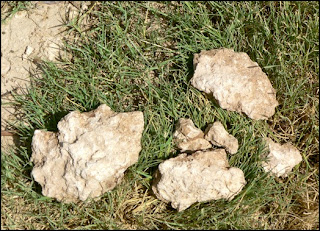Soil: Calcium opens up (flucculates) the soil, improving structure and allowing roots, earthworms, oxygen, water and microbes to move freely through the soil. Calcium is a critically important nutrient for the health of all life in the soil and it is also an important key to achieving the ideal soil pH of 6.4 (where nutrients are most available).
 |
| Alkaline soil with calcium carbonate deposits |
Plants: Calcium is often referred to as the ‘trucker of all minerals” in relation to its role mobilising other nutrients. Calcium sponsors cell division and hence it promotes root, stem, and leaf growth. Calcium is also a major mineral governing cell strength and associated disease resistance. This mineral often determines the quality of your fruit and vegetables and if you are seeking a problem-free garden then it should always be a first priority to address any calcium deficiencies.
Plant Deficiency Symptoms: Stunted root systems and a lack of vegetable vigour. Blossom end rot in tomatoes, capsicums and zucchini. Internal browning or blackening of celery, potatoes and brussels sprouts.
People: Calcium is one of the major minerals linked to bone health and skeletal strength but needs to be balanced with magnesium. It is also a key player in cell function and it regulates the uptake of minerals into our cells. Just as it influences plant uptake of minerals, calcium is an electrolyte important for cellular messaging and the electric life of cells.
Animals : Calcium is a key element in maintaining good growth and bone health in animals. It is also important for healthy hormonal function and reproduction.
Common Forms: Lime stone contains 40% calcium and the finer ground the lime, the faster the response. Builder’s lime is called calcium hydroxide and it contains 30 times more soluble calcium than limestone so it can be used for “fast food”. However, this “hot” material should always be combined with humic acid or compost to buffer the burning potential. Dolomite contains 20% calcium and 10% Magnesium. Gypsum (calcium sulphate) contains 20% calcium and 15% sulphur. Guano contains 35% calcium and 12% potassium.


No comments:
Post a Comment
Thank you for visiting Sense of Humus and for leaving your comments - We love to read your thoughts and ideas!